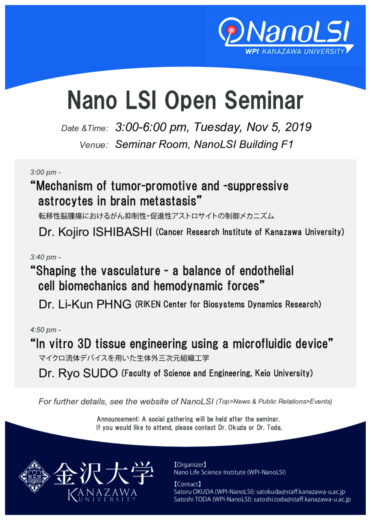NanoLSI Open Seminar will be held
NanoLSI invites you to the open seminar as below.
Date
Tuesday November 5, 2019
[Talk 1] 3:00pm – 3:30pm
[Talk 2] 3:40pm – 4:40pm
[Talk 3] 4:50pm – 5:50pm
Venue
Seminar Room, NanoLSI Building 1F, Kakuma Campus, Kanazawa University
Language
[Talk 1] Japanese (Slides: English)
[Talk 2] English
[Talk 3] English
Talk 1
Title: Mechanism of tumor-promotive and -suppressive astrocytes in brain metastasis
Speaker: Dr. Kojiro ISHIBASHI/ Cancer Research Institute of Kanazawa University
Brain metastasis is a functionally devastating complication with a very poor prognosis, of which number is greatly increasing in association with marked improvement of overall survival of cancer patients. We have previously reported that astrocytes play an important role in the formation of brain metastasis. Recently, we developed the novel culture method of primary astrocytes and identified that there are two different subtypes of astrocytes: tumor-promotive and tumor-suppressive astrocyte in brain metastasis microenvironment. In this seminar, I would like to show the mechanism that determines the subtype of astrocytes in cancer brain metastasis.
Talk 2
Title: Shaping the vasculature – a balance of endothelial cell biomechanics and hemodynamic forces
Speaker: Dr. Li-Kun PHNG/ RIKEN Center for Biosystems Dynamics Research
Many organs become vascularized through the process of sprouting angiogenesis, when endothelial cells from pre-existing blood vessels migrate into avascular regions to generate new vascular sprouts. The subsequent formation of tubular vessels that carry blood flow requires the spatiotemporal coordination of diverse cellular behaviours such as collective cell migration, cell rearrangement and apical membrane expansion, all of which depends on specific cell shape changes. In this talk, I will demonstrate that a tight interplay between endothelial cell biomechanics and haemodynamic force is required for shaping and patterning of blood vessels.
Talk 3
Title: In vitro 3D tissue engineering using a microfluidic device
Speaker: Dr. Ryo SUDO/ Department of System Design Engineering, Keio University
Recent advances in microfluidic device technologies enabled us to control culture microenvironments, such as cell distribution, diffusion and convection, compared to conventional cultureware. We use a microfluidic device containing a three-dimensional gel scaffold and neighboring microchannels, which is a useful platform for tissue engineering of cancer and vascular tissues. In this presentation, I will introduce our recent works on cancer invasion and vascular formation using the microfluidic device. Specific topic will include glioma stem cell invasion in interstitial flow conditions and the effect of hemodynamic stimuli on vascular formation in a microfluidic device.
Organizers
Organized by
Nano Life Science Institute, Kanazawa University
Announcement and Contact
A social gathering will be held after the seminar.
If you would like to attend the party, please contact Dr. OKUDA or Dr. Toda (Nano Life Science Institute).
Dr. Satoru OKUDA: satokuda [at] staff.kanazawa-u.ac.jp
Dr. Satoshi TODA: satoshi.toda [at] staff.kanazawa-u.ac.jp
*Please replace [at] to @.

